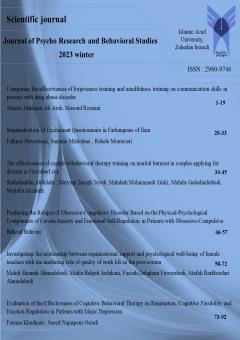Evaluation of the Effectiveness of Cognitive Behavioral Therapy on Rumination, Cognitive Flexibility and Emotion Regulation in
Subject Areas : PsychologyFateme Khedmati 1 , Najarpour Ostadi Saeed 2 *
1 - Msc. Clinical Psychology, Tabriz Branch, Islamic Azad University, Tabriz
2 - Assistant Professor, Department of Psychology, Shabestar Branch, Islamic Azad University, Shabestar, Iran.
Keywords: Cognitive Behavioral Therapy, Cognitive Flexibility, Emotion Regulation, Rumination.,
Abstract :
The aim of this study was to evaluate the effectiveness of cognitive behavioral therapy on rumination, cognitive flexibility and emotion regulation in patients with major depression. It was a semi-experimental research with pretest- posttest and a control group. The statistical population of the study was patients with major depression referred to hamraz counseling in Meshkinshahr in the year 1400. The study sample consisted of 30 patients with major depression were selected by available sampling method and then were assigned to experimental and control groups by random sampling. Data collection tools were rumination questionnaire (Hoeksma & Maro, 1991), cognitive flexibility questionnaire (Dennis & Vanderwaal, 2010) and emotion regulation questionnaire (Gross & John, 2003). For the experimental group, cognitive behavioral therapy based on Beck treatment protocol was performed in 8 sessions of 40 minutes, twice a week. Patients in the control group did not receive any psychological intervention until the end of the post- test phase. The results showed that there is a significant difference between rumination, cognitive flexibility and emotion regulation between the two groups after cognitive behavioral therapy intervention. As a result, cognitive behavioral therapy can be used as effective intervention to reduce rumination and increase cognitive flexibility and emotion regulation in patients with major depression.

